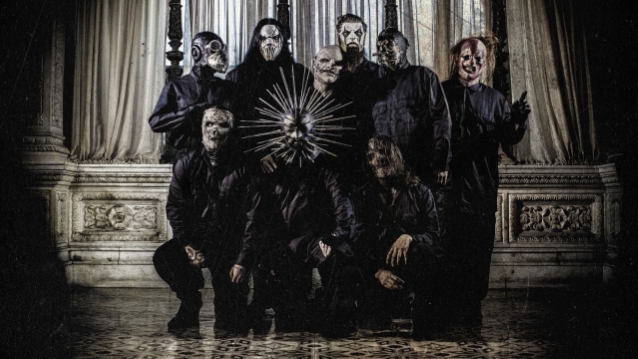
Former Slipknot percussionist Chris Fehn’s lawsuit against the band is set to proceed as planned. A judge in the Supreme Court of New York has denied two motions from the band and their business entities to dismiss the suit.
On Friday (3), Justice Melissa Anne Crane heard the defendant’s (Slipknot) case to dismiss motions five and six of the lawsuit, which called into question the validity of Fehn’s claims (six) and the jurisdiction the lawsuit was filed in (five).
According to the brief on motion six (which was heard first):
“Plaintiff Christopher Fehn’s (“Fehn”) opposition brief only confirms that Fehn does not have any valid claims or causes of action against the Moving Defendants, or against any of the defendant Slipknot corporate entities for that matter. Fehn’s purported claims, as alleged in Counts 2 and 3 of the FAC, are entirely based upon his claims against the alleged Iowa general partnership (the “Partnership”), of which Fehn claims to be a general partner, and which he alleges ran the business of the Slipknot band. Fehn alleges in the FAC and in his opposition brief that this Partnership subsequently created corporate entities, including Moving Defendants, to carry out the business of the band; however, he fails to articulate any wrongdoing by those entities. In fact, he does not allege any conduct whatsoever by these entities. At most, he alleges that at the Partnership’s direction he performed unspecified services for the Slipknot corporate entities, although he admits that he does not know what work he performed and for what entity. (Opp. Br. at 8). Additionally, Fehn fails to describe any particulars of any implied in fact contract with the Slipknot corporate entities; what services he performed for which entity; how any corporate entity breached any implied agreement or how any corporate entity was unjustly enriched or benefitted in any way from his alleged services. Finally, Fehn’s contention that the business of the Slipknot band was conducted through the Partnership defeats his claims against the Slipknot corporate entities because a partnership may not conduct its business in a corporate form. For all these reasons and as further discussed below, Counts 2 and 3 of the FAC should be dismissed.”
To determine the outcome of this motion, Justice Crane wanted to get an idea of what Fehn’s involvement with the Slipknot partnership and its related entities. Defense attorney Melissa A. Salimbene argued that there was no partnership between Fehn and Slipknot. Fehn’s attorney, Joseph Dunne, claimed that whether or not his client was involved, that the “partnership’s business became the domain of those corporations once they were formed.” Ultimately, Justice Crane sided with the plaintiff (Fehn), saying that although it was not phrased in a way she was familiar with, her “initial reaction is that it’s a valid theory in the alternative,” denying the motion on the grounds that “the partnership became the New York entitles, like successor liability in an asset purchase.” She continued, “I need to see it [further]. It may be enough. It’s not whether the plaintiff stated a [particular] cause of action but whether they have a cause of action.”
Motion five was heard next. That claim, filed by Michael Shawn “Clown” Crahan, Corey Taylor and Slipknot’s related corporations that are registered outside of New York, said that the lawsuit against the defendants should be dropped because all involved are not based in New York and would therefore be out of the court’s jurisdiction. Salimbene further argued that Crahan, Taylor and Slipknot do not have ties to New York whatsoever outside of touring and a mailing address for their former manager Rob Shore, which she claims “is not sufficient for general jurisdiction.” Dunne responded by saying that because Rob Shore conducted all of the band’s business out of New York that it is the appropriate jurisdiction, saying that it was the only business address they could find. Said Dunne, “The defendants all list their principal place of business and only place of business as New York. It’s the only place, there’s nothing else. These corporations are at home in New York. All of the invoices and checks probably went to New York. All the documents, records and business records are most likely sitting here in New York. To have the suit spread out over multiple states because one corporation is in Iowa, one is in California, one is in New York [would be onerous].” Though she did not say so much from the bench, Justice Crane indicated during a post-hearing conference that the case would continue on.
Back in March, Fehn sued former bandmates Crahan, Taylor, former manager Rob Shore, his company Rob Shore and Associates and several of Slipknot’s business entities over an earnings dispute. The suit claimed that Fehn wasn’t getting an equal share of the band’s profits, saying that there were extra business entities created without his knowledge that favorite certain members of the band over others financially, namely Crahan and Taylor. Fehn is suing for an investigation into these accounts and to get his “rightful compensation.”
Fehn’s case was dealt a blow back in November when Justice Crane granted a motion from Rob Shore to dismiss the case against him, citing a “default rule” where individuals are generally protected by corporate structures. While Shore as an individual was cleared, Rob Shore and Associates, his company that provided business management for Slipknot and its related entities, was not and that case will continue to proceed.
So far, no further hearings for the case have been scheduled. However, a compliance conference is set to take place on June 18.
In the midst of the lawsuit, Slipknot released their sixth studio album, We Are Not Your Kind, which reached number one on the Billboard 200. The band has a winter European tour lined up, as well as Knotfest in Japan, spring and summer festival dates in East Asia, the US and Europe, and the inaugural Knotfest at Sea in August
[via MetalSucks]









